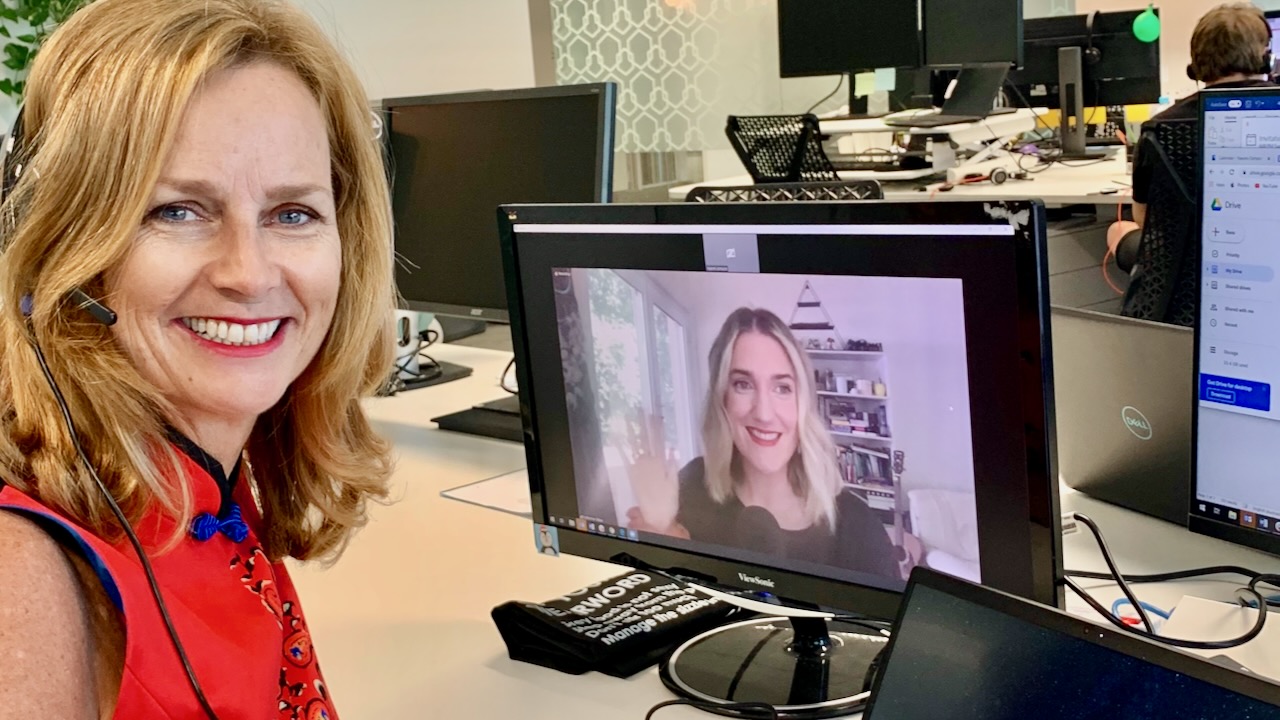The Sliding Door Moment You Can't Afford to Have (And the One You Must Choose)
We all have them. Those moments in life that, in hindsight, were a fork in the road. A 'sliding door' moment where a single decision, a chance encounter, or a sudden turn of events changed everything that came after. Sometimes they are wonderful—the day you meet your partner, the moment you dream up your business idea.
But sometimes, they are the curveballs. The unexpected, gut-wrenching moments that knock you off your feet.
I had one of those curveballs years ago. I was in the thick of building RedBalloon, living the life of the quintessential entrepreneur. I was working 18-hour days, fuelled by adrenaline, caffeine, and a deep-seated fear of failure. I was eating lunch at my desk (if at all), sleeping in four-hour snatches, and my idea of 'switching off' was checking my emails on a different device. I thought this was the price of success. I thought this was what passion looked like.
The curveball came in the form of a doctor's appointment. The details aren't important, but the message was terrifyingly clear. My blood pressure was through the roof, I was physically exhausted, and my body was screaming at me in a language I had been willfully ignoring. The doctor looked at me, not as a CEO, but as a human being who was about to break. He said, "Naomi, if you keep going like this, the sliding door moment you're heading for isn't a business failure. It's a catastrophic health failure."
That was the wake-up call that changed my life. And it taught me the most important small business life lesson there is: Your wellbeing is not the reward you get after you've built a successful business. It is the non-negotiable, foundational asset that allows you to build a successful business in the first place.
We love to talk about business strategy, marketing funnels, and profit margins. But none of that matters if the most critical asset in your business—YOU—is running on empty. This is your guide to reframing small business wellbeing not as a luxury, but as your most powerful competitive advantage.

Why "Hustle Culture" is Killing Our Businesses
There’s a dangerous myth in the world of small business. It’s the Aussie version of "hustle culture." It’s the idea that to be a successful founder, you have to do the hard yakka 24/7. You have to sacrifice everything: your sleep, your health, your relationships. We wear our exhaustion like a badge of honour. "How are you?" "Flat out, mate. So busy."
We tell ourselves this story because it comes from a place of passion and responsibility. We are pouring our life savings and our souls into this venture. The buck stops with us. If we don't do it, no one will.
But here’s the truth: that's not a business strategy, it's a burnout strategy. It’s a recipe for disaster. A business built on the perpetual exhaustion of its founder is built on a foundation of sand.
Think of your business as a high-performance athlete. You are the star player, the coach, and the team doctor all rolled into one. No elite athlete would prepare for a championship by getting four hours of sleep, eating junk food, and never taking a rest day. That would be insane. They know that recovery, fuel, and mental conditioning are essential parts of their performance.
Why, as business owners, do we treat ourselves with less respect than a professional athlete? It's time to ditch the hustle myth and start treating your wellbeing with the strategic importance it deserves.

Your Physical Wellbeing: The Engine Room of Your Business
Let's get practical. This isn't about becoming a supermodel or running a marathon. It's about respecting your body as the engine room of your enterprise. When your engine is sputtering, the whole vehicle falters.
1. Sleep is Not for the Weak; It's for the Wise
We've been conditioned to see sleep as a luxury or a sign of laziness. "I'll sleep when I'm dead," is a common, and frankly, idiotic, catch-cry. Let’s reframe this.
- Sleep is a cognitive enhancer: When you are sleep-deprived, your decision-making abilities plummet. You become more reactive, less creative, and your ability to solve complex problems is shot. That "brilliant" idea you have at 2 am is often just a symptom of a tired brain.
- Sleep is an emotional regulator: Lack of sleep makes you irritable and impatient. You snap at your team, you're short with your customers, and you have less patience for your kids. A good night's sleep is one of the most powerful tools for improving your leadership and your relationships.
Practical Tips:
- Set a "tools down" time: Create a non-negotiable time each night (say, 8 pm) where the laptop is closed and the phone is put on charge in a different room.
- Create a simple wind-down ritual: This isn't about an hour of yoga. It could be as simple as having a cup of herbal tea and reading a few pages of a book (a real book, not on a screen!). This signals to your brain that it's time to switch off.
2. You Can't Run a V8 on Two-Stroke Fuel
What did you have for lunch yesterday? If you're like most small business owners, it was probably something eaten hastily over your keyboard, or a sausage roll from the servo. We demand high performance from our brains but give them the cheapest, nastiest fuel.
Practical Tips:
- Hydrate, mate! So much of that "3 pm slump" is just dehydration. Keep a big bottle of water on your desk and make it your mission to finish it.
- The 5-Minute Rule for Lunch: You don't need an hour. Just give yourself five minutes. Step away from your desk. Go outside if you can. Eat your food without looking at a screen. It will change the entire second half of your day.
- Stock your workplace with smart snacks: Have things like nuts, fruit, or yoghurt on hand so you’re not reaching for a chocolate bar when your energy dips.
3. Movement is a Mind-Clearing Machine
The word "exercise" can feel intimidating. So let's call it "movement." Your body is designed to move, and your mind is designed to benefit from it. When you feel stuck on a problem, the absolute worst thing you can do is stay chained to your desk, staring at it.
Practical Tips:
- Take your calls for a walk: If you have a phone call that doesn't require you to be at a screen, put your headphones in and walk around the block while you take it.
- Schedule a 15-minute "thinking walk" into your afternoon. It's not for fitness; it's for clarity. The gentle rhythm of walking can unlock ideas your stressed-out brain couldn't find.
- Find something you actually enjoy: Don't force yourself to go to the gym if you hate it. Maybe it's a weekend hike with the family, a social game of tennis, or just cranking up the music and having a dance in the living room.
Your Mental Wellbeing: The Captain of the Ship

If your body is the engine, your mind is the captain. And the captain of a small business is navigating some seriously choppy waters: financial stress, the weight of responsibility for your staff, and a profound sense of isolation.
The loneliness of being a small business owner is a silent epidemic. You can't complain to your staff, you don't want to burden your partner, and your mates in regular jobs just don't get it. Protecting your mental and emotional wellbeing isn't soft; it’s the most resilient thing you can do.
1. Find Your Tribe (This is Not Optional):
You absolutely must find other people who are on the same journey.
- Join a local business group.
- Find a mentor or form a small, informal mastermind group with 2-3 other business owners you trust.
- The purpose of this tribe isn't just business strategy. It's a safe place to say, "I'm having a shocker of a week and I feel like packing it all in." Hearing someone you respect say, "Me too, mate. I felt like that last month," is more therapeutic than any business book.
2. Practise Strategic Disconnection:
Your brain needs a break. You need to create deliberate boundaries between your "business self" and your "human self."
- The "Fake Commute": If you work from home, this is for you. At the end of your designated workday, go for a ten-minute walk around the block. When you walk back in the door, you are officially "home." You've left work.
- Appoint a "Worry Time": Instead of letting anxieties pop up all day, give yourself a scheduled 15-minute "worry window" in the afternoon. You can worry as much as you like then. If a worry pops up outside that time, jot it down and tell yourself you'll deal with it in your scheduled slot. It sounds silly, but it can be incredibly effective at containing anxiety.
3. Give Yourself Permission to be Human:
You are going to make mistakes. You are going to have bad days. You are not a superhero. The most powerful act of self-care is self-compassion. Talk to yourself the way you would talk to your best mate if they were having a tough time. You'd be kind, encouraging, and remind them of how far they've come. It’s time you offered yourself that same courtesy.
The Sliding Door Moment You Can Choose
Let's go back to that fork in the road.
If you continue to neglect your wellbeing, your sliding door moment will be chosen for you. It will be a health crisis that forces you to close the doors. It will be a burnout so severe that you have to sell the business you love for a fraction of its worth. It will be a moment of deep regret.
But when you proactively choose to invest in your small business wellbeing, you get to choose your own sliding door moment.
Because you are well-rested and clear-headed, you see a new opportunity in the market that your exhausted competitors miss. Because you have the energy and resilience, you decide to expand your business from a place of strength, not desperation. Because you have perspective, you choose to hire a manager, take a step back, and finally enjoy the freedom you started the business for in the first place.
These are the sliding door moments that lead to a life of success and satisfaction. They are not a matter of luck. They are the direct result of your investment in your own health.
Your Most Valuable Asset
Look around your business. Your computer, your equipment, your intellectual property... none of it is as valuable as you are. You are the source of the ideas, the passion, and the resilience that makes it all work. You are the business's most precious asset.
It's time to start treating yourself like one.
I'm not asking you to change your whole life overnight. I'm asking you to pick one thing. Just one. Will you commit to leaving work on time one night this week? Will you take a proper lunch break tomorrow? Will you call that mate who also runs a business and have a proper yarn?
Choose one small act of strategic self-care. Because your wellbeing is not a distraction from your work; it is the very foundation of your life's best work. Take care of yourself. The business will thank you for it.
Frequently Asked Questions (FAQs) on The Sliding Door Moment
What is a "sliding door moment"?
A "sliding door moment" is a seemingly small, insignificant point in time where a minor decision or a chance event ends up altering the entire trajectory of your future. It's a pivotal fork in the road—like choosing to attend one event over another, or making one phone call—that unknowingly sets you on a completely different path in your career or personal life.
How can you recognize a sliding door moment when it happens?
Recognizing these moments in real-time is incredibly difficult because they often appear ordinary. The key is to cultivate a state of presence and openness. By being more mindful and attuned to your intuition, you increase the chances of noticing a small opportunity or a gut feeling that nudges you in a direction you hadn't planned for, which could turn out to be your pivotal moment.
How does the concept of a sliding door moment apply to business and careers?
In business, sliding door moments are frequent. They can be a chance conversation in a coffee line that leads to a major partnership, a decision to pivot a product based on a single piece of customer feedback, or the choice to hire a candidate who goes on to transform the company. It underscores the immense power of seizing small, unexpected opportunities.
What is the biggest lesson from understanding sliding door moments?
The biggest lesson is that you don't need to have your entire future perfectly mapped out. Instead, it's more important to stay curious, be brave enough to say "yes" to unexpected invitations, and trust that even the smallest steps in a new direction can lead to extraordinary destinations. It's an embrace of serendipity over rigid planning.
Can you create your own sliding door moments?
While you can't control chance, you can absolutely increase the probability of encountering a sliding door moment. You can do this by intentionally placing yourself in new environments, actively networking outside your usual circle, and consistently trying new things. By expanding your horizons, you dramatically increase the surface area for serendipity to strike.





